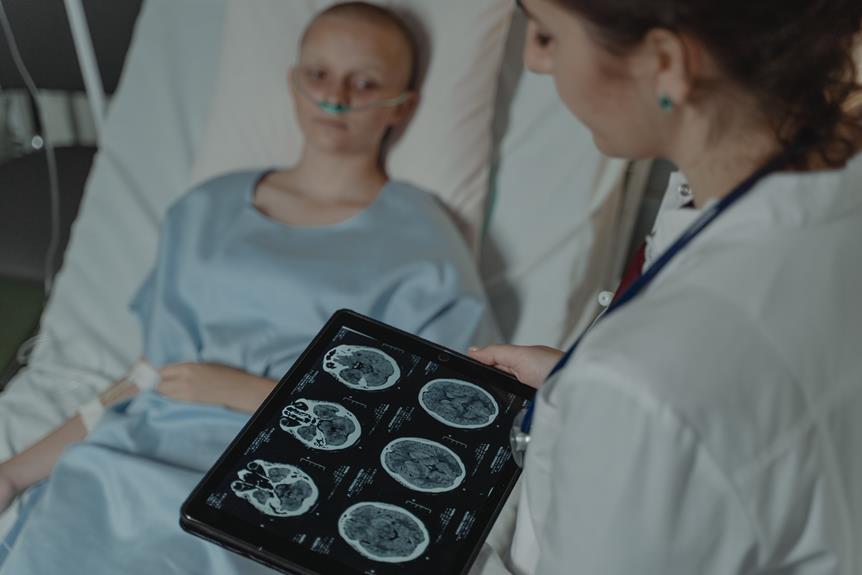Uncover the Secrets to Cancer Diagnosis
Understanding the complexities of cancer diagnosis presents a significant challenge. This article provides an in-depth exploration of the process, from symptom identification to staging and prognosis. Highlighting the importance of medical consultation, staging's role in treatment plans, and understanding prognostic factors, we aim to demystify the diagnosis process. This piece is a valuable resource for those seeking clarity on cancer diagnosis and staging.

Key Takeaways
- Understanding cancer biology and genetics is essential for devising diagnostic tests to identify specific genetic changes.
- Early detection of cancer through imaging techniques and biopsies increases the chances of successful treatment.
- Accurate diagnosis through pathology reports helps determine the type and stage of cancer, guiding treatment plans.
- Seeking a second opinion in cancer diagnosis ensures comprehensive evaluation and an effective treatment strategy.
The Basics of Cancer: An Overview
Cancer, a complex group of diseases characterized by uncontrolled growth and spread of abnormal cells, poses significant challenges in terms of early detection, accurate diagnosis, and effective treatment. In the basics of cancer: an overview, we delve into its intricate biology and diverse types. This entails understanding genetics in cancer diagnosis, as genetic mutations often underpin cancer development. The abnormal behavior of cancer cells is largely due to changes in their genetic material, or DNA. This knowledge is instrumental in devising diagnostic tests that can identify specific genetic changes. The dynamics of this disease, from its inception to its progression, may differ vastly among individuals due to genetic variations. Therefore, a deep understanding of cancer genetics is crucial in advancing personalized cancer diagnostics and treatments.
Early Signs and Symptoms of Cancer
Understanding the numerous early signs and symptoms of cancer is a crucial step towards timely and effective diagnosis. One cannot overstate the importance of early detection in the battle against this disease. Symptoms can vary widely and may include persistent cough, unexplained weight loss, fatigue, and changes in skin. Recognizing these signs can prompt individuals to seek medical help and undergo necessary diagnostic tests. These tests include imaging procedures, biopsies, or blood tests, which can confirm or rule out the presence of cancer. The sooner cancer is detected, the higher the chances of successful treatment. Therefore, awareness of these symptoms, prompt consultation, and appropriate diagnostic tests are essential in managing and potentially overcoming cancer.
The Role of Imaging in Cancer Detection
In the realm of oncology, the significance of imaging technology cannot be underestimated, and its role in detecting, diagnosing, and monitoring the progression of cancer is essential. Modern imaging techniques offer an unparalleled window into the human body, enabling physicians to spot cancerous growths and abnormalities at their earliest stages, thus increasing the chances of successful intervention. These techniques, including MRI, CT scan, PET scan, and ultrasound, have revolutionized early detection and have greatly improved the survival rates of cancer patients. Furthermore, they provide a non-invasive means of monitoring a patient's response to treatment, making adjustments if necessary. Ultimately, the application of these advanced imaging techniques represents a vital component in the fight against cancer.
The Importance of Biopsies in Cancer Diagnosis
While imaging techniques provide valuable insights into the presence and location of abnormal growths, it is through the process of biopsy that doctors can definitively diagnose cancer by examining tissues or cells under a microscope. The role of biopsies in treatment decisions cannot be overstated. Biopsies not only confirm the presence of cancer but also help determine the type and stage of the disease, which are crucial aspects in formulating an effective treatment plan. Moreover, the significance of accurate diagnosis through biopsies is paramount. It reduces the chances of over or under-treatment, thus ensuring patients receive the most appropriate care for their specific condition. In essence, biopsies provide the necessary clarity needed for a successful battle against cancer.
How Pathology Reports Contribute to Diagnosis
Regularly, pathology reports play a crucial role in the diagnosis of cancer by providing detailed analysis of tissue samples obtained through biopsies. Pathologists, medical professionals specializing in diagnosing disease by examining body tissues, interpret these reports. Their role is pivotal because their findings guide treatment plans. The importance of accurate diagnosis cannot be overstated. An accurate diagnosis identifies the type and stage of cancer, which is essential in determining the most effective treatment methods. Misdiagnosis can lead to unnecessary or inappropriate treatment, possibly worsening the patient's condition. Therefore, the information contained in pathology reports, interpreted by skilled pathologists, is vital in the fight against cancer, underlining the significance of their contribution to cancer diagnosis.
Understanding Genetics in Cancer Diagnosis
Through the lens of medical advancements and with the aid of modern technology, understanding the role of genetics in cancer diagnosis has become not only feasible but also paramount for creating personalized treatment plans. Genetic testing, a process involving the analysis of DNA, RNA, chromosomes, proteins, and certain metabolites, is now playing a crucial role in diagnosing various types of cancer. By identifying specific genes, mutations, or proteins that are associated with a particular type of cancer, genetic testing helps in making an accurate diagnosis. This development has paved the way for personalized medicine, a medical approach where treatment is tailored to the individual patient. By considering a patient's genetic makeup, personalized medicine allows for a more targeted and efficient approach to cancer treatment.
The Process of Cancer Staging
The process of cancer staging, a critical step in the overall diagnosis and treatment plan, involves assessing the size and spread of the tumor within the body. It serves as a key determinant in forming a comprehensive treatment strategy. The role of biomarkers in staging is paramount as they help in identifying the molecular characteristics of the cancer, thereby providing a more targeted approach to treatment. Furthermore, the use of imaging in staging, such as CT scans or MRIs, gives clinicians a visual representation of the tumor's location and size, allowing for a precise evaluation of the cancer's progression. Therefore, both biomarkers and imaging play crucial roles in the accurate staging of cancer, aiding in the development of an effective treatment plan.
The Impact of Tumor Grade on Diagnosis
Evaluating the grade of a tumor, which refers to how much the cancer cells resemble normal cells under a microscope, and understanding its implications on diagnosis are fundamental aspects of the diagnostic process in oncology. The impact of tumor grade can significantly influence treatment options and prognosis. A high-grade tumor, characterized by abnormal, rapidly dividing cells, is often associated with an aggressive disease and poorer prognosis. Conversely, a low-grade tumor, with cells closely resembling normal cells, usually indicates a slower-growing cancer with a better prognosis. The role of biomarkers is instrumental in determining tumor grade, aiding in this critical assessment. Biomarkers, substances found in blood, urine or tissues, can provide insight into the biological behavior of the tumor, further enhancing diagnostic accuracy and informing treatment decisions.
Treatment Options Post-Diagnosis
After a conclusive cancer diagnosis, a multitude of treatment options may become available, tailored to the specific type, grade, and stage of the cancer. These options, crafted to provide the best possible outcome, range from surgery, radiation, chemotherapy to new-age techniques like targeted therapies and immunotherapies. The selection of treatment options post-diagnosis may be an overwhelming process. Therefore, emotional support from family, friends, and professional counselors is crucial. This support aids in managing the emotional turmoil accompanying the diagnosis and in making informed decisions. A blend of emotional support and a clear understanding of treatment options significantly helps in navigating the journey post-diagnosis, fostering a positive approach towards the treatment and eventual recovery.
The Role of Second Opinions in Cancer Diagnosis
In the complex and nuanced process of cancer diagnosis, obtaining a second opinion can play a critical role in confirming the initial diagnosis and exploring potential treatment strategies. The role of second opinions extends beyond verification; it brings forth diverse insights, new perspectives, and may uncover additional information about the type, stage, or location of the cancer. The benefits of seeking multiple opinions include a broader understanding of the disease, a sense of control over one's health, and the opportunity to find the most suitable treatment plan. Second opinions can also foster a collaborative approach among medical professionals, ensuring a comprehensive evaluation of the patient's condition, and ultimately leading to a more precise and effective treatment strategy.
Navigating Emotional Responses to a Cancer Diagnosis
Dealing with a cancer diagnosis often brings about intense emotional responses, and learning how to cope with these feelings can play a significant role in the overall journey towards recovery. Navigating emotional responses can be challenging, with feelings of shock, fear, anger, or sadness potentially overwhelming the patient. Recognizing these emotions as natural responses to a daunting situation is the first step towards managing them. Developing coping strategies is integral in this process. This might involve seeking support from loved ones, joining a support group, engaging in physical activities, or seeking professional help from a counselor or psychologist. These coping mechanisms can help patients to better manage their emotional responses, thereby improving their capacity to handle the treatment process and possibly enhancing their overall prognosis.
The Importance of Regular Follow-Ups After Diagnosis
While a cancer diagnosis is a significant milestone in the patient's journey, it is crucial to understand that regular follow-ups after this point can play a pivotal role in managing the disease and enhancing the effectiveness of the treatment plan. Regular check-ups allow for timely detection of any changes or progression in the disease, enabling early intervention and adjustment of treatment strategies. These visits also provide an opportunity for patients to discuss any concerns or side effects they may be experiencing. Long term monitoring, a crucial component of post-diagnosis care, ensures that the patient's health remains a priority even after initial treatment has concluded. Ultimately, regular follow-ups and long term monitoring significantly contribute to better outcomes and improved quality of life for cancer patients.
Advances in Cancer Diagnosis: A Look at the Future
Remarkably, the future of cancer diagnosis holds promising advances, largely attributed to the continuous evolution of technology and medical research. Advances in liquid biopsies are particularly noteworthy, enabling the detection of cancer-related DNA and proteins in a patient's bloodstream. This non-invasive technique could revolutionize early detection and monitoring of the disease. Simultaneously, the future of artificial intelligence in cancer diagnosis is gaining momentum. AI algorithms can analyze intricate patterns in imaging or genetic data, potentially outperforming human accuracy. These developments could lead to quicker, more precise diagnoses, significantly improving patient outcomes. Undoubtedly, the marriage of technology and medical research is shaping a transformative era in cancer diagnosis.
Frequently Asked Questions
How Does Unexplained Weight Gain or Loss Indicate the Possibility of Cancer?
Unexplained weight gain or loss can be an early indication of cancer due to abnormal cell growth affecting the body's metabolism. Dietary influence and genetic predisposition may contribute to these weight fluctuations. The sudden weight change, not related to diet or exercise, may highlight an underlying health issue such as cancer. Therefore, any significant, unexplained weight change should be discussed with a healthcare professional for further investigation.
What Is the Significance of Different Stages in Cancer and How Do They Impact the Treatment Decisions?
Cancer staging indicates the extent of cancer in the body, with each stage having a distinct significance. Staging accuracy is vital as it directly impacts treatment decisions, determining which therapies are most likely to be effective. The identification of cancer biomarkers, substances that are produced by tumors or in response to cancer, also plays an important role in diagnosis, prognosis, and treatment planning. This comprehensive information guides physicians in providing personalized care for each patient.
What Role Do Survival Statistics Play in Estimating the Prognosis of Cancer?
Survival statistics play a significant role in prognosis estimation for cancer. These statistical interpretations provide data on the percentage of people with a similar type and stage of cancer who survive a certain amount of time after diagnosis. They help in predicting the likely course of the disease, informing treatment decisions, and determining the patient's life expectancy. However, these are general figures and individual prognosis may vary based on various factors.
What Are Some Important Questions That I Should Ask My Doctor to Better Understand My Cancer Diagnosis and Prognosis?
To better understand your cancer diagnosis and prognosis, it's crucial to engage in open diagnosis communication with your doctor. Ask about the specifics of your cancer type, stage, and potential treatment options. Inquire about the role of genetic testing in your diagnosis, its implications for treatment, and if it could provide additional insights. Understanding survival statistics and factors affecting your prognosis would also be beneficial. Remember, clarity in these matters can significantly aid your treatment journey.
Where Can I Find Reliable Research Articles and News Stories Related to Cancer Diagnosis and Staging?
Reliable research articles and news stories related to cancer diagnosis and staging can be found on reputable medical and health-focused websites such as PubMed, the American Cancer Society, and the National Cancer Institute. These resources detail advancements in diagnostic technologies and insights into genetic predispositions, contributing significantly to the field of oncology. They offer comprehensive information on the latest cancer research, providing a valuable tool for understanding diagnosis and staging.
Conclusion
Understanding the complexities of cancer diagnosis, from early symptom identification to staging and prognosis, is crucial. Regular follow-ups and open communication with medical professionals can enhance informed decision-making. Advances in medical technology promise to further refine the diagnostic process. This comprehensive exploration of cancer diagnosis and staging should serve as a valuable resource for individuals seeking to demystify this challenging aspect of cancer care.

This post has been generated by AI and was not reviewed by editors. This is Not legal advice. Please consult with an attorney.




